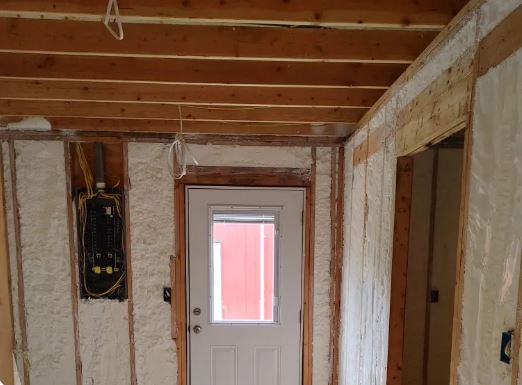When it comes to insulating a home or commercial space, selecting the right type of insulation is crucial for achieving energy efficiency and comfort. One of the key choices homeowners and businesses face is between hiring a spray foam insulation contractor and opting for traditional insulation methods. This blog will delve into the differences between these two approaches, highlighting their respective benefits and drawbacks, to help you make an informed decision.
Understanding Spray Foam Insulation
What is Spray Foam Insulation?
Spray foam insulation involves applying a liquid foam that expands upon application, filling gaps and creating an airtight seal. This foam can be either closed-cell or open-cell, each offering unique benefits. Closed-cell spray foam is known for its high R-value and moisture resistance, making it ideal for areas prone to dampness. Open-cell spray foam, on the other hand, is less dense and provides excellent soundproofing qualities.
Benefits of Choosing a Spray Foam Insulation Contractor
- Superior Insulation Performance: A spray foam insulation contractor offers insulation solutions that provide a high R-value per inch of thickness, which means better thermal performance and energy efficiency.
- Air Sealing Capabilities: Spray foam expands on application, filling every nook and cranny. This results in superior air sealing, reducing drafts and heat loss compared to traditional insulation methods.
- Moisture Resistance: Closed-cell spray foam acts as a barrier to moisture, which can help in preventing mold growth and structural damage due to dampness.
- Soundproofing Benefits: Open-cell spray foam is particularly effective at reducing noise transmission, making it a good choice for spaces where sound control is important.
- Longevity and Durability: Spray foam insulation is long-lasting and resilient, which means fewer replacements and repairs over time.
Comparing Traditional Insulation Methods
Types of Traditional Insulation
Traditional insulation methods include fiberglass batt insulation, blown-in fiberglass insulation, and blown-in blanket insulation. Each type has its own set of benefits and limitations.
- Fiberglass Batt Insulation: This is a common choice for many homeowners due to its affordability and ease of installation. However, it can leave gaps if not installed properly, reducing its overall effectiveness.
- Blown-In Fiberglass Insulation: This type of insulation is ideal for filling existing wall cavities and attics. It provides good coverage but can settle over time, potentially leading to reduced performance.
- Blown-In Blanket Insulation: This method is similar to blown-in fiberglass but uses a different material that may offer better coverage and thermal performance.
Advantages and Disadvantages of Traditional Insulation
- Cost-Effectiveness: Traditional insulation methods tend to be less expensive upfront compared to spray foam insulation. However, the potential for reduced energy savings over time might offset these initial savings.
- Installation Flexibility: Traditional insulation can be easier to install in certain applications, particularly in existing structures where walls and ceilings are already in place.
- Limited Air Sealing: Unlike spray foam, traditional insulation does not provide an airtight seal. This can lead to higher energy bills due to air leaks and reduced insulation performance.
- Potential for Moisture Issues: Fiberglass and blown-in materials can be susceptible to moisture absorption, which can lead to mold issues if not properly managed.
Evaluating the Best Option for Your Needs
Energy Efficiency and Comfort
A spray foam insulation contractor typically delivers superior energy efficiency and comfort by providing a higher R-value and better air sealing. This translates into lower energy bills and a more stable indoor climate.
Installation Considerations
If you’re renovating an existing home or building, spray foam insulation may offer a more comprehensive solution, especially in hard-to-reach areas. Traditional insulation might be more suitable for new constructions or areas with easy access.
Long-Term Value
While spray foam insulation might have a higher initial cost, its durability and efficiency can offer better long-term value. Traditional insulation may require more frequent maintenance or replacement, potentially leading to higher costs over time.
Conclusion: Making the Right Choice
Choosing between a spray foam insulation contractor and traditional insulation methods depends on your specific needs and circumstances. Spray foam insulation excels in providing high-performance insulation, superior air sealing, and moisture resistance, making it a great choice for both new and existing structures. Traditional insulation methods, while generally more cost-effective upfront, might not offer the same level of energy efficiency or durability.
For those in Bastrop County, Burleson County, Lee County, Milam County, Travis County, Washington County, and Williamson County, Texas, considering the benefits of spray foam insulation can lead to long-term savings and enhanced comfort. To explore your options and get professional advice tailored to your needs, contact a reputable spray foam insulation contractor today.
FAQ
- What is the main difference between closed-cell and open-cell spray foam insulation?
Closed-cell spray foam is dense, offers higher R-value, and is more resistant to moisture. Open-cell spray foam is less dense, provides good soundproofing, and is typically less expensive.
- How does spray foam insulation help with energy efficiency?
Spray foam insulation creates an airtight seal, reducing air leaks and improving the overall thermal performance of your home or building, which can lead to lower energy bills.
- Is traditional insulation a good choice for new construction?
Traditional insulation methods can be effective for new construction projects, offering cost savings and ease of installation. However, spray foam insulation might provide better long-term benefits in terms of energy efficiency and comfort.
- How long does spray foam insulation last?
Spray foam insulation is known for its durability and can last for the life of the building if properly installed and maintained.
- Can spray foam insulation be used in existing homes?
Yes, spray foam insulation can be applied to existing homes, particularly in areas where traditional insulation might not be as effective, such as wall cavities and attics.
By understanding the differences between spray foam insulation and traditional methods, you can make a more informed decision that aligns with your energy efficiency goals and comfort needs. For expert advice and high-quality insulation solutions, reach out to a H&H Spray Foam & Drywall today.


